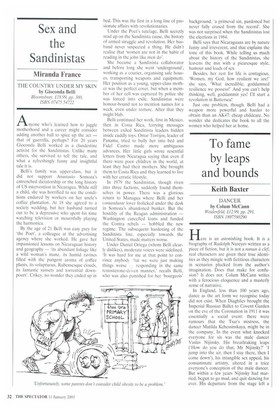Sex and the Sandinistas
Miranda France
THE COUNTRY UNDER MY SKIN by Gioconda Belli Bloomsbury, 08.99, pp. 380. ISBN 07475 54722 Anyone who's learned how to juggle motherhood and a career might consider adding another ball to spice up the act — that of guerrilla, perhaps? For 20 years Gioconda Belli worked as a clandestine activist for the Sandinistas. Unlike many others, she survived to tell the tale, and what a refreshingly funny and insightful tale it is.
Belli's family was upper-class, but it did not support Anastasio Somoza's entrenched dictatorship or the long history of US intervention in Nicaragua. While still a child, she was horrified to see the conditions endured by workers on her uncle's coffee plantation. At 18 she agreed to a society wedding, but her husband turned out to be a depressive who spent his time watching television or mournfully playing the harmonica.
By the age of 21 Belli was easy prey for 'the Poet', a colleague at the advertising agency where she worked. He gave her impassioned lessons on Nicaraguan history and geography — 'its abundant foliage like a wild woman's mane, its humid ravines filled with the pungent aroma of coffee plants, its voluptuous, Rubensesque clouds, its fantastic sunsets and torrential downpours'. Crikey, no wonder they ended up in bed. This was the first in a long line of passionate affairs with revolutionaries.
Under the Poet's tutelage, Belli secretly read up on the Sandinista cause, the history of armed struggle and revolution. Her husband never suspected a thing. He didn't realise that 'women are not in the habit of reading in the john like men do'.
She became a Sandinista collaborator and before long she went 'underground', working as a courier, organising safe houses, transporting weapons and equipment. Her position as a young, upper-class mother was the perfect cover, but when a member of her cell was captured by police she was forced into exile. Sandinistas were honour-bound not to mention names for a week, even under torture. After that they might blab.
Belli continued her work, first in Mexico, then in Costa Rica, ferrying messages between exiled Sandinista leaders hidden inside cuddly toys. Omar Torrijos, leader of Panama, tried to bully her into bed and Fidel Castro made more ambiguous advances. Her little girls wrote resentful letters from Nicaragua saying that even if there were poor children in the world, at least they had their mothers. She brought them to Costa Rica and they learned to live with her erratic lifestyle.
In 1979 the Sandinistas, though riven into three factions, suddenly found themselves in power. There was a glorious return to Managua where Belli and her comandante lover frolicked under the desk in Somoza's abandoned bunker. But the hostility of the Reagan administration — Washington cancelled loans and funded the Contra rebels — hobbled the new regime. The subsequent hardening of the Sandinista line, especially towards the United States, made matters worse.
Under Daniel Ortega (whom Belli clearly dislikes), moderate voices were sidelined. 'It was hard for me at that point to convince anybody hat we were just making things worse H responding in the same testosterone-driven manner,' recalls Belli, who was also punished for her 'bourgeois'
background, 'a primeval sin, pardoned but never fully erased from the record'. She was not surprised when the Sandinistas lost the elections in 1984.
Belli says that Nicaraguans are by nature funny and irreverent, and that explains the tone of this book. While telling us much about the history of the Sandinistas, she leavens the mix with a picaresque style, humour and loads of sex.
Besides, her zest for life is contagious. 'Women, my God, how resilient we are!' she says, 'What incredible, goddamned resilience we possess!' And you can't help thinking, well, goddammit yes! I'll start a revolution in Battersea!
Just one problem, though. Belli had a weapon more powerful and harder to obtain than an AK47: cheap childcare. No wonder she dedicates the book to all the women who helped her at home.


























































 Previous page
Previous page